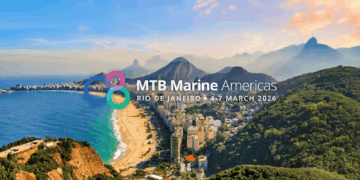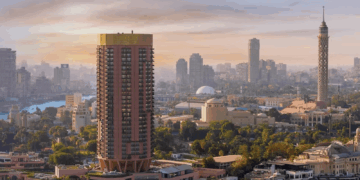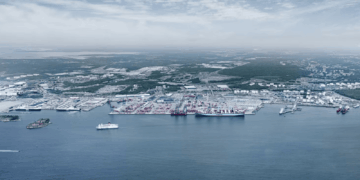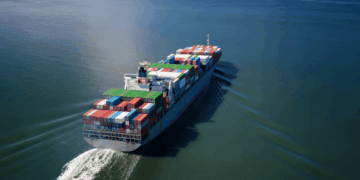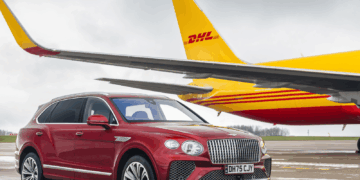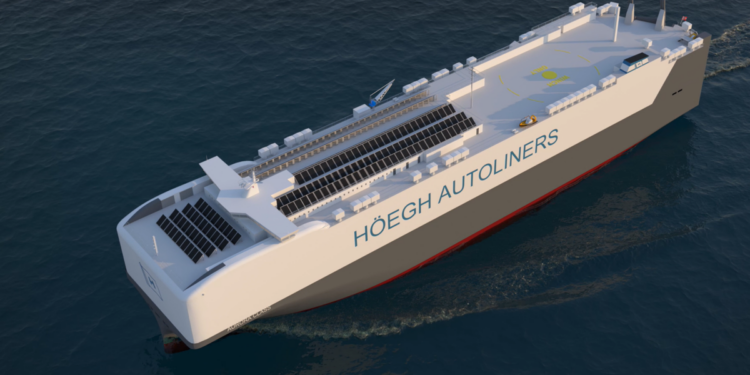As part of its “Ammonia fuelled vessel programme,” Höegh Autoliners was awarded an additional NOK 109.4 million in Enova funding. This will guarantee that four of the company’s Aurora Class vessels may run solely on ammonia when they are delivered in 2027. The total amount of Enova capital that the company will get is NOK 255.4 million.
The funds are a part of the biggest funding round for the green maritime transition ever offered by Enova. The money has been allocated to create the first operational ammonia and hydrogen value chains for use in maritime applications.
“At Höegh Autoliners, we take leadership by actively collaborating with a wide range of highly qualified and dedicated suppliers to make clean ammonia viable as a zero-emission shipping fuel. We believe it is important for shipping companies to send a clear signal to the rest of the value chain that the technology can be realized in a short time and that there will be demand for carbon-neutral fuel. Almost all Höegh Autoliners vessels sail under the Norwegian flag and have significant Norwegian content from the Norwegian cluster. The support from Enova, together with our innovative multi-fuel vessel design, significantly helps derisking the choice of bringing the first zero-carbon vessels to our industry.”
Andreas Enger, CEO of Höegh Autoliners.
Twelve Aurora Class ships are currently being ordered by Höegh Autoliners. The ships carry rolling freight, which includes typical solo goods that needs to be delivered as well as vehicles, mining equipment, and agricultural machinery.
Eight Aurora Class ships, the first of which is scheduled for delivery in August, will run on LNG. It is intended for these vessels to be adapted to run on ammonia. By 2026, ammonia engine technology will be complete, enabling us to construct the final four vessels to run entirely on ammonia. These vessels, which will be the first in our class to be emission-free globally, will be delivered in 2027 and will be revolutionary.
Höegh Autoliners received NOK 146 million in Enova funding in March of this year for two Aurora Class vessels. This is because the cost of this solution is lower than it would be for a vessel that is “ammonia ready”.
Contributions from the Aurora Class boats will be substantial in helping the firm reach its 2040 net zero emissions target. As one of the earliest and select shipping firms in the world, Höegh Autoliners has obtained the first ammonia 2-stroke engines supplied by MAN.
“With this support, Norway as a maritime nation, is sending a strong sustainability message. This is important for the whole Norwegian maritime cluster and for our continuous efforts to lead the way to more sustainable deep-sea transportation and a greener maritime sector. It is visionary and a key component in the green maritime transition becoming a reality. Höegh Autoliners is grateful for Enova’s support, which we view as a strong endorsement of our newbuild project. We aim at a net zero emissions future by 2040 and our Aurora Class vessels, the largest and most environmentally friendly PCTC vessels ever built, will be the first zero-carbon vessels in our industry able to run on ammonia by 2027. To get to net zero, we must make clean ammonia, perfect for long-distance transportation with our two-stroke engines, viable as the future shipping fuel, and send a clear signal to the rest of the value chain that the technology can be developed and implemented in a short time. Public-private collaboration is crucial for advancing the maritime green transition, particularly in implementing mechanisms to lower the cost of sustainable fuels until they reach parity with fossil fuels in the years to come.”
Sebjørn Dahl, COO of Höegh Autoliners.
The Enova money, which will support both hydrogen and ammonia boats, was awarded to seven companies, including Höegh Autoliners.
Presently, three percent or so of the world’s greenhouse gas emissions come from shipping. Deep-sea shipping accounts for 90% of that.
By increasing demand for zero-emission fuels, the Enova funding will contribute to the establishment of a successful first market for zero-emission maritime transportation, which will signal a turning point towards environmental sustainability for the maritime industry.
“The competition was fierce, and there were many good projects that unfortunately did not quite make it. It bodes very well for the further investment and the next round of applications. With this and the other pioneering projects that are now being awarded, Norway is leading the way, and we see that the maritime industry is at a tipping point where the transition can accelerate from here.”
Nils Kristian Nakstad, CEO of Enova.
If you are interested in meeting with Maritime businesses committed to reducing their carbon footprint, contact us today to learn about our MTB Marine events.

